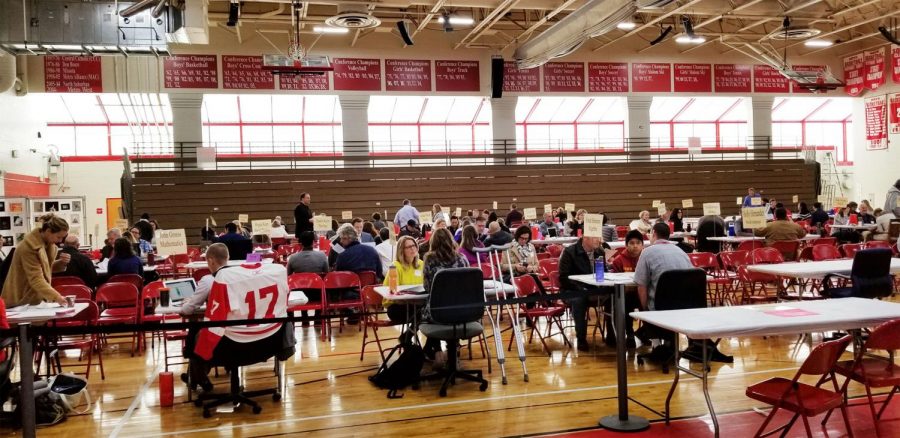Conferences moved up to enhance communication
If this were any other school year, conferences would be this weekend. This year, they were moved from November to October in order to provide for earlier communication.
Teachers gathered in the Great Hall with parents this past October for conferences. This was the first time conferences weren’t held in November.
November 9, 2018
A slight modification was made this fall semester: BSM’s conferences were moved from November to October. The change may have seemed subtle, but to some teachers, this means having to build a relationship with the student earlier to understand their strengths and weakness in order to give proper feedback to parents.
The reason for the shift is solely to look out for a students best interest. By having the conferences at an earlier time, students have a extended chance to bump their grades up. “Last year, the teachers and I started talking about timing for conferences. There was a concern that by the time the quarter ended and we had conferences, we were already in that first week of november and let’s say things were not going well for a student, the parents would come and when the parents came to conferences there wasn’t as much time left in the semester to improve things.This way, you start the conversation earlier with parents. If there needs to be something to improve you have a longer run time to do that,” Senior High Principal Dr. Susan Skinner said.
Social Studies teacher Mr. Jeff Fix noticed a slight difference with conferences retaining to how an extra month can secures tighter relationships with some students. “I would say that I felt like I knew most of my students well enough; like AP Gov, I think I knew kids well enough—the class is kind of a different format, we do more talking and discussing, working in small groups and things like that. I would say it was a bit more challenging with US history to know kids well enough, but part of it too then is hopefully the parents come and you meet the parents, one of the questions you can ask: ‘What can I do to help your child,’” Fix said.
For some teachers, the switch wasn’t so simplistic. English teacher Ms. Calli Olson struggled with jungling a fall sport, keeping up to date on grades, and preparing for an early conference date.“I was probably more on the negative side of moving conferences up. It made a major difference to me, but it was a combination of personal and professional reasons. I coach a fall sport and am involved in both JV and Varsity, and usually I have at least a few weeks after JV ends to get my head in line and my grades at least somewhat up to date before conferences, but this year, conferences were 3 days after our last JV game. Professionally, I felt it was too early to have a good grasp on student achievement and progress, and though I am lucky to have the superpower of remembering names of students very quickly, it can be very difficult to match a face with a name that early in the year, especially with the sporadic nature of our schedule in the first month or two of the school year,” Olson said.
The general consensus of moving conferences up a month was positive. “I surveyed the teachers and most of the teachers thought that the earlier timing was better and some had no opinion. The teachers liked it because they felt parents were less stressed if things needed to improve there was more time to do that,” Skinner said.






































![Teacher Lore: Mr. Hillman [Podcast]](https://bsmknighterrant.org/wp-content/uploads/2025/03/teacherlorelogo-1200x685.png)












